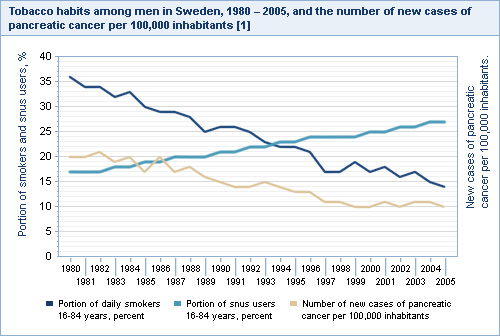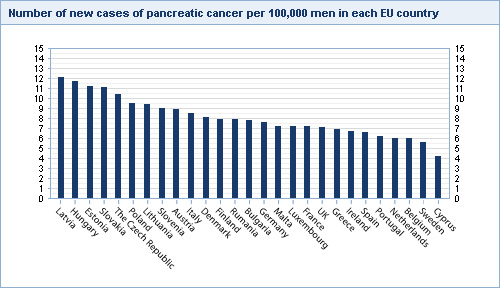Snus and pancreatic cancer?
Recently, Swedish and Norwegian media have published alarming reports claiming that snus causes pancreatic cancer. But, is the alarm motivated from a scientific perspective?
The most important and well-established risk factor for pancreatic cancer is smoking. There are also studies that support a connection between alcohol, diabetes and pancreatic cancer.
Has the risk of being affected by pancreatic cancer increased in Sweden relative to the increase in the use of snus?
No, the risk has decreased by 50 percent among Swedish men since the middle of the 1980s, despite the increase in snus usage. The reduced risk has been parallel with the decrease in the number of smokers, which illustrates the significance of smoking as cause of this disease. It is also true that Swedish men, compared with men in all 27 EU countries, run a very low risk of being affected by pancreatic cancer.

[1] The number of new cases of pancreatic cancer among men, age 0 – 85+, per 100,000 inhabitants.
Age standardization according to the population in Sweden in 2000. Source: The Swedish Board of Health and Welfare’s statistic database.
Portion of daily smokers, users of snus (daily + occasionally). The same scale for smokers and users of snus as a percentage. Source: Sweden’s Central Bureau of Statistics/Swedish Survey of Living Conditions.
Number of new cases of pancreatic cancer per 100,000 men in each EU country
 AGR (Age Standardized Rate), age standardized number of new cases per 100,000 inhabitants, based on a standard for world population (W). Assessments for 2002, based on the most recent available data. Source: WHO/IARC Cancer data GLOBOCAN 2002: http://www-dep.iarc.fr/
AGR (Age Standardized Rate), age standardized number of new cases per 100,000 inhabitants, based on a standard for world population (W). Assessments for 2002, based on the most recent available data. Source: WHO/IARC Cancer data GLOBOCAN 2002: http://www-dep.iarc.fr/
Differing conclusions in studies
The warning in the media about a connection between snus and pancreatic cancer was based on a Norwegian and a Swedish epidemiological study (Bofetta et al, Luo et al). It is generally accepted within epidemiologic science that results from such studies must fulfill a number of criteria in order to draw accurate conclusions on causation. A statistical association alone is not enough. The association found should be strong, the results should be consistent, and there should be a dose-effect relationship, that is, the more snus an individual consumes, the greater the risk.
The two current studies demonstrate none of these criteria: the connection between snus and pancreatic cancer was weak (relative risk <1.5-2), the results were not consistent (the Norwegian study showed an increased risk only among snus users who were also smokers, while the Swedish study observed an increase only among those who did not smoke), and there was no dose-effect relationship. This means that there may well be other explanations for the statistical associations in these studies than that snus causes pancreatic cancer.
There were methodological problems in both studies. For instance, the participants were interviewed several decades ago so it was uncertain whether their tobacco habits had changed during the follow-up period (how many snus users had switched to smoking?) Other problems were the select nature of the participants and the failure to control for other significant life style factors, including alcohol consumption and dietary habits.
The problems with the Norwegian study are such that it was disqualified from a compilation of the scientific literature related to snus and cancer, which was recently published by the equivalent to Swedish Council for Health Care Technology Assessment in New Zealand (Broadstock et al).
Are there studies that do not support a connection?
Yes, there are. In a recently published Swedish epidemiological study by Rosaar et al from 2006, slightly more than 20,000 Swedes were monitored for about 30 years. No association was found between snus usage and smoke-related cancer (including pancreatic cancer).
Unmotivated cancer scares
It is well-established in biomedical science that several high standard studies must show consistent and unambiguous results before there is reason to issue warnings to the general public. In certain studies, even coffee, sugar and alcohol have been associated with risk increases for cancer that have been statistically significant. But, as with snus, there are other studies showing no association. Consequently, there is no motivation for media alarm or warnings about cancer to the general public - either for these products or for snus.
Lars Erik Rutqvist, medical advisor, Swedish Match AB, Professor, formerly Head of the Department of Oncology, Karolinska University Hospital/Huddinge
Mobile: +46 (0)768 - 788 498, e-mail: lars-erik.rutqvist@swedishmatch.com
Freddi Lewin, medical advisor, Swedish Match North Europe AB, Associate Professor, formerly Senior Consultant, Department of Oncology, Karolinska University Hospital/Huddinge
Mobile: +46 (0)70 - 467 11 91, e-mail: freddi.lewin@swedishmatch.se
REFERENCES:
Boffetta P, Aagnes B, Weiderpass E, Andersen A. Smokeless tobacco use and risk of cancer of the pancreas and other organs. Int J Cancer 2005;114(6):992-5.
Luo J, Ye W, Zendehdel K, Adami J, Adami HO, Boffetta P, Nyren O. Oral use of Swedish moist snuff (snus) and risk for cancer of the mouth, lung, and pancreas in male construction workers: a retrospective cohort study. Lancet. 2007 Jun 16;369(9578):2015-20.
Roosaar A, 2006 Oral mucosal lesions, tobacco use and the long-term outcome in a Swedish population. Thesis, Karolinska Institute, Stockholm Sweden.
Broadstock M. Systematic review of the health effects of modified smokeless tobacco products. New Zealand Health Technology Assessment, NZHTA Report Vol 10, No. 1, Feb 2007.